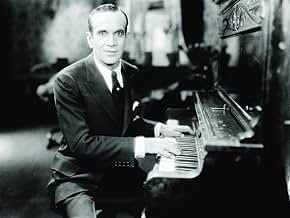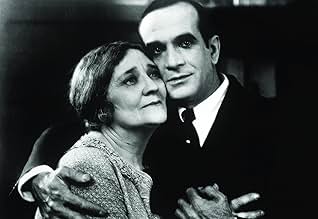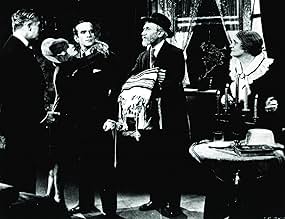Il figlio di un cantore ebreo deve sfidare le tradizioni del padre religioso per perseguire il suo sogno di diventare un cantante jazz.Il figlio di un cantore ebreo deve sfidare le tradizioni del padre religioso per perseguire il suo sogno di diventare un cantante jazz.Il figlio di un cantore ebreo deve sfidare le tradizioni del padre religioso per perseguire il suo sogno di diventare un cantante jazz.
- Regia
- Sceneggiatura
- Star
- Candidato a 1 Oscar
- 3 vittorie e 1 candidatura in totale
- Jakie Rabinowitz - Age 13
- (as Bobby Gordon)
- Cantor Rosenblatt - Concert Recital
- (as Cantor Joseff Rosenblatt)
- Chorus Girl
- (non citato nei titoli originali)
- Chorus Girl
- (non citato nei titoli originali)
- Small Part
- (non citato nei titoli originali)
- Choreographer - 'April Follies'
- (non citato nei titoli originali)
- Small Part
- (non citato nei titoli originali)
- Violinist
- (non citato nei titoli originali)
- Small Part
- (non citato nei titoli originali)
- Buster Billings
- (non citato nei titoli originali)
- Dance Director
- (non citato nei titoli originali)
Recensioni in evidenza
I'd like to comment on someone else's comments now. Someone said this movie was very racist and that's why it was successful, saying, "Would this film have still been successful if it was just Jolson as himself and not black-faced? Probably not. That's because people watched it to make themselves feel better about themselves."
I wonder if this commenter actually saw the movie. Jolson is only wearing blackface for about 15 minutes for a performance. The rest of the movie, Jolson IS himself. Jolson never plays an African-American as his character in the movie, he just sings a song as one. Yes, the song is somewhat racist by today's standards, but most of this comment is not valid at all. In fact, I suspect the comment was written solely based on a glance at the video box cover.
Anyway, if you wanna see a historical landmark in film or if you wanna see a fabulous movie (half-talkie, half-silent), go ahead and see "The Jazz Singer."
Though, not being the first "talkie", The Jazz Singer, is certainly a remarkable film; it still holds its place as an cinematic landmark for being the first feature-length Hollywood "talke" film in which "spoken dialogue was used as part of the dramatic action." However, it's still largely a silent film with a synchronized musical score and a handful of sound sequences built around singing. It's also become something of a controversial case because of Al Jolson's (arguably the most popular entertainer of his time) use of blackface in some of the musical sequences, forgetful of the fact that this was a theatrical artifice from the era; it wasn't intended as "mean-spirited" as so many claim it to be. It was actually praised by black newspapers in 1927, and was being done by another much defamed minority, a Jew.
You can see what an impact sound must have had in 1927, because it certainly wasn't the movie that made this production a phenomenon. Though, the film itself, is more than just a movie about a guy who likes music. It's also a story about a Jewish kid who turns his back on his heritage to try and make it big on the stage - exceptionally daring subject matter for its era, and still enthralling today. It's certainly not ragged and dull, though, the magic moment when Jolson turns to the camera to announce, "You ain't heard nothing' yet" - a line so loaded with unconscious irony that it still raises a few goose bumps. Audiences were captivated by this and still are to this very day. A must see!!!
Lo sapevi?
- QuizThis is the first feature-length movie with audible dialogue.
- BlooperMary recieves a telegram dated August 8, 1927. Later in the film, Jack is seen writing a letter to Mary, dating it August 7, 1927.
- Citazioni
[opening lines, first quote and first words in the first widely-seen talking picture]
Jack Robin: Wait a minute, wait a minute, you ain't heard nothin' yet! Wait a minute, I tell ya! You ain't heard nothin'! You wanna hear "Toot, Toot, Tootsie"? All right, hold on, hold on...
[then he walks back to one of the band members]
Jack Robin: Lou, listen. Play "Toot, Toot, Tootsie", three chorus, you understand. In the third chorus, I whistle. Now give it to 'em hard and heavy, go right ahead.
- ConnessioniEdited into Okay for Sound (1946)
- Colonne sonoreMy Gal Sal
(1905) (uncredited)
Written by Paul Dresser
Sung by Robert Gordon (dubbed by an unidentified singer)
I più visti
Dettagli
Botteghino
- Budget
- 422.000 USD (previsto)
- Tempo di esecuzione
- 1h 28min(88 min)
- Colore
- Proporzioni
- 1.33 : 1






























